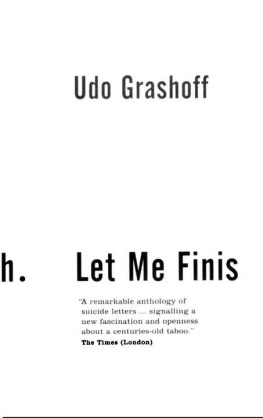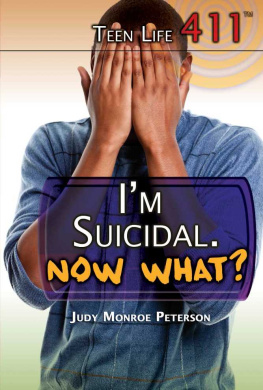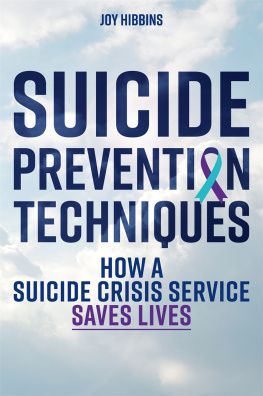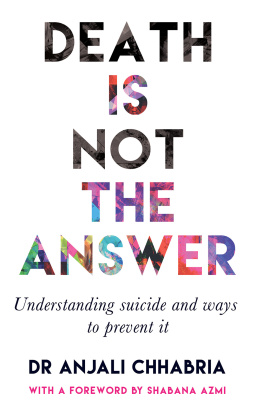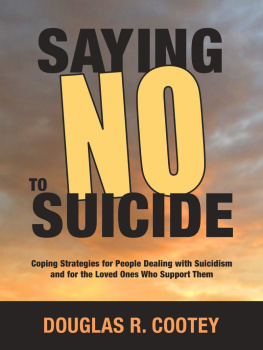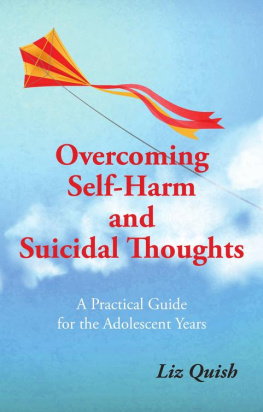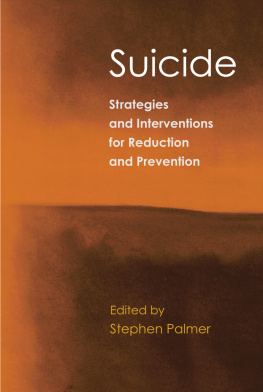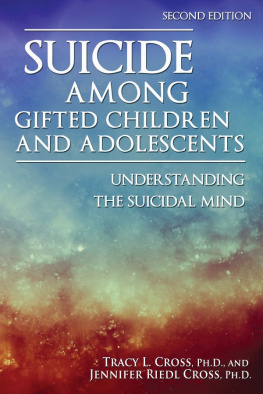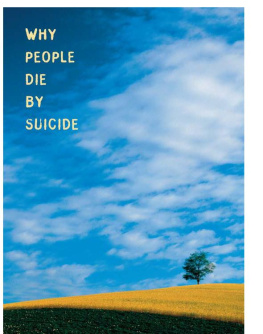Udo Grashoff - Let Me Finish
Here you can read online Udo Grashoff - Let Me Finish full text of the book (entire story) in english for free. Download pdf and epub, get meaning, cover and reviews about this ebook. year: 2006, publisher: Da Capo, genre: Detective and thriller. Description of the work, (preface) as well as reviews are available. Best literature library LitArk.com created for fans of good reading and offers a wide selection of genres:
Romance novel
Science fiction
Adventure
Detective
Science
History
Home and family
Prose
Art
Politics
Computer
Non-fiction
Religion
Business
Children
Humor
Choose a favorite category and find really read worthwhile books. Enjoy immersion in the world of imagination, feel the emotions of the characters or learn something new for yourself, make an fascinating discovery.
- Book:Let Me Finish
- Author:
- Publisher:Da Capo
- Genre:
- Year:2006
- Rating:3 / 5
- Favourites:Add to favourites
- Your mark:
- 60
- 1
- 2
- 3
- 4
- 5
Let Me Finish: summary, description and annotation
We offer to read an annotation, description, summary or preface (depends on what the author of the book "Let Me Finish" wrote himself). If you haven't found the necessary information about the book — write in the comments, we will try to find it.
Let Me Finish — read online for free the complete book (whole text) full work
Below is the text of the book, divided by pages. System saving the place of the last page read, allows you to conveniently read the book "Let Me Finish" online for free, without having to search again every time where you left off. Put a bookmark, and you can go to the page where you finished reading at any time.
Font size:
Interval:
Bookmark:

Udo Grashoff
"'Kill yourself? - What's the point? It achieves absolutely nothing." Precisely: it achieves nothing, and nothingness is what I want.' These words - written by the Austrian poet Herta Kraftner in her diary in September 1951, two months before she killed herself - have a determined, self-assured ring. But why did the twenty-three-year-old crave 'nothingness'?
An engineer, who killed his whole family as well as himself, wrote a crowing PS at the end of his suicide letter: 'We're happier than you are'. To those (like me) who wish to carry on living and who believe that the future holds endless opportunities, such words are hard to understand. What can possibly have so warped someone's vision and so utterly destroyed their hopes that they long for death and actively seek it? In earlier centuries the Church offered a simple answer to comfort those left behind: anyone who killed himself was 'possessed by the Devil'. In the present day medicine appears to offer an explanation: suicide is seen as the conclusion of a pathological process.
Medical explanations may be valid in many cases, but not everyone who takes their own life is ill. Suicide is not brought about by a syndrome of some kind. This has been pointed out more than once by the writer and commentator Jean Amery, among others. Suicide is one of mankind's privileges, an option available to everyone.
Children seldom seek death, probably because they have no realistic concept of what it means to 'do away with yourself', but it is a possibility that begins to take shape during puberty at the latest. Psychiatrists agree that, in principle, there is potential risk of a suicide attempt in every young person passing through adolescence. We live our lives knowing that we are free to end them; but how do we deal with this knowledge?
Even today, suicide is a subject that people prefer not to talk about. Cases of suicide can trigger intense fear, especially in those who are closely involved with the person, such as spouses, friends and even therapists. As psychoanalysts often stress, people's own fear of death is activated by encounters with the suicidal tendencies of others. This fear probably also lies at the heart of the suicide taboo.
The unspoken rule forbidding open discussion of suicide was maintained for centuries in the West, particularly by the Church. According to Christian doctrine, those who took their own lives were putting themselves beyond the moral pale and were almost seen as criminals. Since the eighteenth-century Enlightenment, the taboo has increasingly lost its force, but its after-effects are still perceptible. We retain a blend of fear and fascination that has impeded both our ability to understand suicide and our capacity to find an appropriate way of dealing with it.
Within the Christian churches, a less simplistic approach to suicide, owing a great deal to the insights of modern medicine, has gained ascendancy. In the media, the topic of suicide is now generally presented and discussed in a factual way. This book likewise seeks to offer a dispassionate perspective on suicide - avoiding the current trench warfare over such politicised issues as assisted suicide and attempted suicide. I believe that we should look calmly at this subject, instead of either staring or averting our eyes as we have done in the past. In my view, our society needs to take stock not only of success, but also of failure, as we see amongst us every day.
Now that suicide is the subject of professional interest and analytical debate, the death of people by their own hands is sometimes interpreted in totally distorted ways. Doctors hunt for risk factors that predispose people to suicide, and - in line with the principles of preventive medicine - seek to devise protective measures. Sociologists generalise on the basis of individual cases and link suicide rates to the weather, the economy, the political situation or even `happiness'. Moral theologians methodically weigh up different ethical factors in order to discover whether or not there are worse evils than suicide. Journalists exploit the cliche of the `victim driven to suicide' in order to criticise institutions they don't like. Novelists use the motif of suicide to depict unusually self-obsessed tragic heroes.
My own activities also need to be included in this list, as I have been working for several years on a contemporary history dissertation, analysing the way suicide was dealt with in the former East Germany, the German Democratic Republic (GDR). I am often asked what caused me, as a historian, to devote my energies to the topic of suicide. Reasons that one might expect, such as suicide attempts of my own - the reason given by Al Alvarez, for instance, author of The Savage God, for his interest in suicide - do not apply in my case, and there have been no traumatic deaths among my family or friends. What led me to the taboo subject of suicide was my search for a research topic with an `existential' dimension, and one that has so far been little explored. As I combed through the documentation in various archives, I came across numerous suicide letters that I found very striking and often deeply moving. The idea then arose that I should publish some of these letters in book form.
The original documents consisted mainly of photocopies and transcripts from the archives of the police, security services, education authorities, medical publications and medical dissertations, and some have already been published in books and magazines. Spelling mistakes and grammatical errors have been left unchanged so that the letters appear exactly as they did in the originals.
To safeguard the privacy of surviving family members, dates, places and other details (such as family relationships and number of children) have been altered or deleted. Names have been replaced by initials. The letters therefore make it possible to share in authentic testaments to human despair without the issue being clouded by specific personalities. No one social class has a monopoly on suicide: education, intelligence and social position have almost no effect on the likelihood of any particular individual committing suicide. Furthermore, suicide letters by artists and other prominent figures, and suicide letters from the world of literature, have already been published elsewhere, and could therefore be largely dispensed with in the present book.
Can suicide letters contribute to a better understanding of people who die by their own hand? W. Morgenthaler, a Swiss psychologist who embarked on an analysis of suicide letters some sixty years ago, remarked that 'severe disappointment awaits anyone inclined to expect that people who have decided to take leave of life and stand before the dark gates of death become especially clearsighted, or can offer us a better slant on the mysteries of death and dying, or can even peer through the gates into the realm beyond. Quite the reverse is true: their gaze becomes not clearer but more befuddled, or at the very least severely restricted.'
Font size:
Interval:
Bookmark:
Similar books «Let Me Finish»
Look at similar books to Let Me Finish. We have selected literature similar in name and meaning in the hope of providing readers with more options to find new, interesting, not yet read works.
Discussion, reviews of the book Let Me Finish and just readers' own opinions. Leave your comments, write what you think about the work, its meaning or the main characters. Specify what exactly you liked and what you didn't like, and why you think so.

